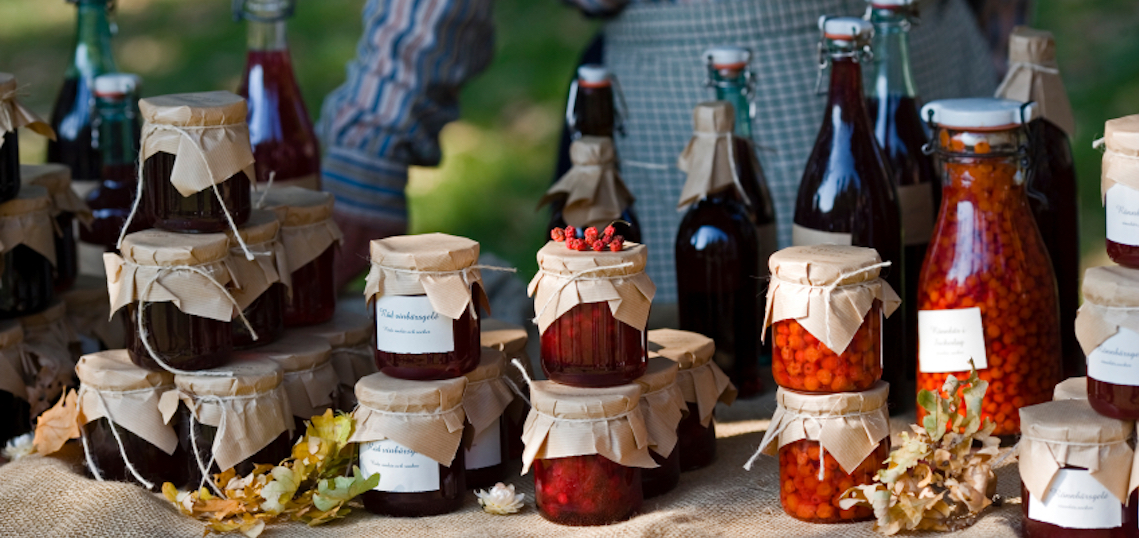Want to learn more about Amish traditions, culture, and heritage? Want to see how The Amish Village changes over the seasons? We pack our blog with helpful articles all about the Amish culture and some news about The Amish Village.
An Authentic Look at Canning in the Amish Community

One of the staples in the Plain Community is preserving food into the winter months when the garden is no longer producing and the harvest has long since been collected. For generations, Amish families have prepared for the winter and spring seasons by canning, a method by which they seal food in glass jars to preserve it for future use. But, while the “English” (non-Amish and non-Mennonite people) can use modern electric stoves and dishwashers to prepare their jars, the Amish have largely kept the old traditions of canning, with a few twists.
To better understand the Amish tradition of canning, we caught up with Martha, a young Amish woman running a stand at the Green Dragon Market in Ephrata, PA. While she considers herself somewhat new to canning, Marth agreed to share a few tips she has learned over the years.
Newly married, Martha started canning in earnest just this year. It is common among Amish women to only get serious about canning when it is their turn to provide for the family. While Amish children often help with canning while growing up, it’s considered the mother’s responsibility to sort out what they can, the recipes they use, and how much they “put up.” Martha says she still asks her mother for help with recipes or questions about the process.
Martha gets satisfaction from canning, and even calls it “fun.” When asked what part of this hot, laborious work was fun, she laughed and said it was the part where she gets to look at the completed jars and know she’s set for the winter.
Her favorite things to can (and eat in the winter) are salsa and soup, though she admits these aren’t the easiest things to can. “Salsa takes a really long time because of all of the vegetables,” she said. While English food preppers might use food processes to finely chop the tomatoes, onions, and other salsa ingredients, Amish women do it all by hand. This adds significant time to the prep work before the mixed salsa can be added to hot jars for processing. When asked why the expected answer of “peaches” wasn’t her favorite, Martha replied, “I think I had too many of them when I was a little girl.”
What some may find surprising is that the Amish will can meat as well as fruits and vegetables. Martha said this year she canned mostly chicken and ground venison. The benefit of this is whenever she’s ready to set a meal in the winter, the meat is already prepped and ready to be added to any recipe. No need to wait for the meat to cook! This is particularly useful if last-minute guests arrive just in time for the evening meal.
“Some people always use new lids for the meat because it takes so long to make… You don’t want it to spoil after all that!” – Martha
Preparing meat for canning is a bit easier than preparing for salsa. Martha noted her secret was to simply chop the chicken and add salt and pepper. “That’s it!” she reported with a smile. Of course, she also needed to make sure the meat was cooked through during the process. English families might use a pressure canner for their canned meats to ensure their meats are cooked during the process. Martha reported that in addition to any pre-cooking she did, she let the meat process – or cook within their jars placed in a large pot of boiling water – for three hours. Fortunately, as Martha notes, you don’t need to watch the jars during this process, which frees you to do other things while you wait.
The process of canning hasn’t changed much over the decades, though Amish women today may use a propane-powered or generator-powered stove, depending on what their particular Community and Bishop allows. Martha uses a propane-powered stove to heat water to sterilize her jars and for the canning process. When asked if she uses new lids with each jar – a common practice among English who can – she said she is more likely to boil and reuse her lids. “Some people always use new lids for the meat because it takes so long to make,” Martha notes. Remember, chicken takes three hours minimum to process. “You don’t want it to spoil after all that,” stated Martha.
Some people might be surprised to learn that canning is not an Amish woman’s only means of preserving food. Some Amish communities allow their members to use freezers, whether that is by placing a freezer in a willing English neighbor’s house, or by using a gas-powered freezer in their own home. While Martha says she does freeze some food, she prefers canning. “Frozen food needs to be thawed before it can be used,” she said, also noting that frozen food tastes different than the canned counterpart.
Since Martha’s wedding last spring, she has been establishing her new home with her husband. Her mother gave her a few jars to get started, and she received some jars as a wedding present. Martha will also purchase second-hand jars at yard sales or wherever she can find them around the county. She currently prefers pint-sized jars for canning as she is predominantly preparing meals for two.
The practice of canning has been handed down from mother to daughter in the Amish community for generations. We offer visitors to our Amish Village the chance to taste some authentically Amish canned goods by making them available in our Amish market. You’ll find fruit jams, preserves, vegetables, signature Lancaster County delicacies like red beat eggs and chow chow. If you experience our Backroads Bus Tour, you’ll have another opportunity to purchase Amish canned goods and crafts when we stop at an Amish business along the way (Mondays through Saturdays only). You can also learn more about Amish cooking by taking a tour of our authentic Amish farmhouse where you’ll be guided through a real Amish kitchen by one of our knowledgeable tour guides. Or, benefit from both the Backroads Bus Tour and our Amish Farmhouse tour to learn the most about the Amish community in Lancaster County.
Join us for a tour, and come ready with questions about the Amish and canning!


